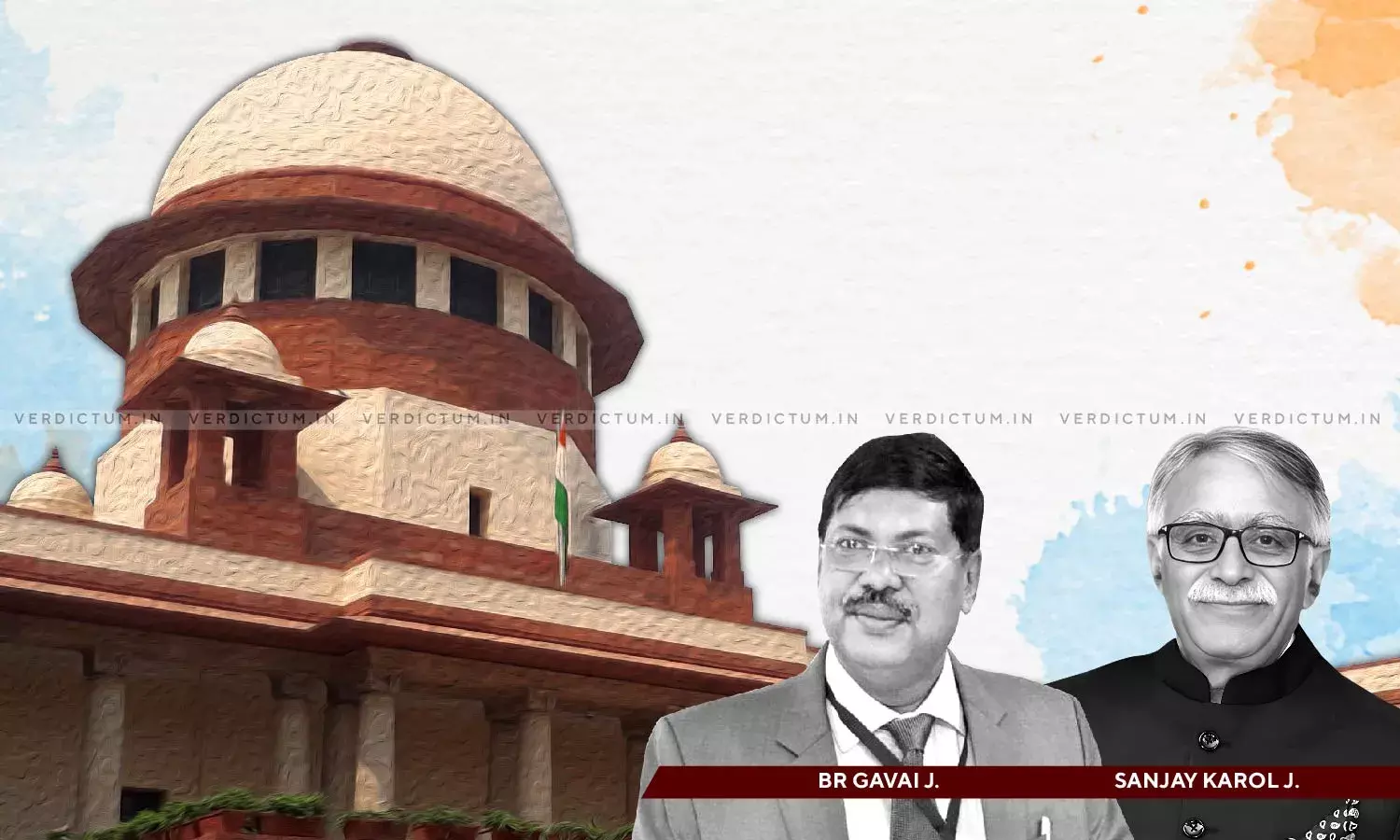"Investigation Officer Did Not Meet Obligations, Numerous Infirmities Present"- SC While Setting Murder Accused At Liberty
A Supreme Court Bench of Justice BR Gavai and Justice Sanjay Karol has set a murder accused at liberty on finding that there were numerous infirmities that affected the conduct of the Investigation Officer which called into question the investigation conducted by him.
Counsel Anish R Shah appeared for the appellant, while Counsel Gautam Narayan appeared for the Respondent.
In this case, the appellant approached the Apex Court against a judgment passed by the High Court. The appellant alone had been convicted for committing an offence punishable under Section 302 of the IPC, Section 201 of the IPC, and Section 25(1)(1-b)(a) of the Arms Act. He was sentenced to life imprisonment and fines, and the sentences under the various offences were to run concurrently.
The Court formed the following issues and answered them accordingly.
(i) Whether the Investigating Officer in the present case had complied with the duties and responsibilities cast upon him by virtue of Chapter XII of Code of Criminal Procedure Code, 1973.
The Court found various lapses in the testimony of the Investigating Officer, and therefore, did not find its veracity to be inspiring.
One such instance was that he admitted that both the memo of arrest and recovery were prepared by him nor bore his signature, and also had many corrections and overwriting, thus reducing the correctness and authenticity of the document. Further, he was unclear about the description of the articles recovered.
In that context, the Court noted that "The investigation of offences to bring the offender to the book and facilitate the ultimate search for truth is one of the important duties the police has to perform. This is a statutory duty under the Cr.P.C. and is also a constitutional obligation ensuring the maintenance of peace and the upholding of rule of law".
On perusal of a catena of judgments, including Pooja Pal vs Union of India, the Court observed that the Investigating Officer did not meet the obligations he was under.
(ii) Whether the court below, while acquitting all the other co-accused in connection with the same crime, erred in not returning a finding qua the instant appellant - a co-accused in respect of a charged framed under Section 120B of the Indian Penal Code, 1860.
The Court relied on the judgment passed in Geeta Devi vs State of UP & Ors., where it was observed that the High Court, by virtue of being the First Appellate Court ought to be appreciated and discussed the evidence on record.
Subsequently, it was observed that "Had that been done completely in the present case, the High Court would have returned a finding on Section 120B of IPC. The charge of criminal conspiracy requires meeting of the minds prior to commission of offence, and with four of the five appeals being allowed and only the present appellant being convicted, the basic requirement of the section, that is of two or more persons agreeing to or causing to be done an illegal act or an act which is not per se illegal but it is done by illegal means, is not met".
In furtherance of the same, it was observed that "The impugned judgment, however, only records that Section 10 and 30 of the Evidence Act, 1872, which deal with things having been said or done by a conspirator in reference to common design and a proved confession being considered as against another person; are not applicable and then observes that the sentence handed down to Pankaj Singh does not call for any interference. Therefore, the Court implies that the conviction in its entirety including the sentence for criminal conspiracy is upheld".
The Apex Court was of the considered opinion that such a view could not be upheld.
(iii) Whether the impugned judgments convicting the appellant are sustainable in law or not.
The Apex Court observed that "the High Court, without appreciating the testimonies of the witnesses mentioned above in their true import and meaning, and without having any discussion concerning the complicity of the accused, in a perfunctory manner held the prosecution to have established the case, which is entirely circumstantial in nature, against the present appellant. Significantly, the High Court holds that the evidence reveals that “in all human probability the act must have been done by the accused”. Inter alia, it is this finding which we find to be erroneous, for the principle of determining the guilt of the accused in a case involving circumstantial evidence is not that of probability but certainty and that all the evidence present should conclusively point towards only a singular hypothesis, which is the guilt of the accused".
Setting aside the order of the High Court, the Apex Court directed that the accused was to be set at liberty.
Cause Title: Maghavendra Pratap Singh @ Pankaj Singh v. State of Chhattisgarh
Click here to read/download the Judgment












